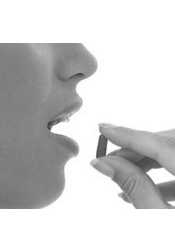Zyban® tablets
This product is manufactured by Bausch Health Canada using the ingredient bupropion hydrochloride.
This product is taken orally.

play
orally
Why is it prescribed?
Bupropion is used in the treatment of depression and as an aid in smoking cessation. This material will only cover its use in smoking cessation therapy.
- Take Zyban® as directed by your doctor. Swallow Zyban® tablets whole. Do not crush, cut or chew the tablets. Doing so could result in more drug than needed being released initially from the tablet and increase the chance of unwanted effects.
- Zyban® may be taken with or without food. If you have trouble sleeping at night while taking Zyban®, take the second dose a few hours earlier. Make sure there is still at least 8 hours between your first and second doses.
- Ideally you should stop smoking during the second week of taking Zyban®.
- If you are bothered with dry mouth while taking Zyban®, try sucking on sugarless candies or ice chips, or chewing sugarless gum.
- Be sure to consult your pharmacist or doctor if your experience skin rashes or other unwanted effects while taking Zyban®.
- Treatment with Zyban® is more successful when it is combined with behaviour changes and/or support programs.
Alternatives
See other products used in the treatment of •depression •nicotine addiction •nicotine withdrawal symptoms •
- The usual recommended dose of Zyban® is one 150 mg tablet every morning for the first three days followed by one 150 mg tablet twice daily (morning and evening). Be sure to take your doses at least 8 hours apart.
- It takes about 1 week for Zyban® to reach the right levels in your body to be effective.To maximize your chance of quitting, you should not stop smoking until you have taken Zyban® for 1 week.
- Zyban® is usually prescribed for 7-12 weeks. You may need to take it for a longer period of time to prevent you from returning to previous smoking behaviour. Your doctor will tell you how long you should take it according to your individual needs.
- Zyban® is not indicated for use in people younger than 18 years of age.
Bupropion modifies the effect of certain chemical messengers in the central nervous system. Its exact mechanism as a smoking cessation aid isn't clear but may involve changes in norepinephrine and/or dopamine pathways. It has been suggested that dopamine plays a role in the reinforcement of addiction and norepinephrine in the withdrawal symptoms that occur when the addicting agent is discontinued. Bupropion reduces the craving for nicotine and the withdrawal symptoms (e.g. irritability, anxiety, depressed mood) that may occur when smoking is stopped.
Along with its needed effects, bupropion may cause some unwanted or undesirable effects. Generally, bupropion is well tolerated and many people will not experience unwanted effects. The frequency and severity of these effects is dependant on many factors including dose, duration of therapy and individual susceptibility. Possible unwanted effects include:
- dry mouth
- trouble sleeping
- runny nose
- dizziness
- nausea
- constipation
Uncommon:
- vomiting
- agitation
- headache
- tremor
- rashes
Rare but serious side effects: Seek medical help if you experience:
- allergy (e.g. itching, hives, rash, difficulty breathing)
- increased blood pressure
- seizures
- new or worsened emotional or behavioural problems, such as hostility, agitation, thoughts of suicide.
- peeling of the skin, or rash combined with blisters around the mouth, eyes or genitals.
- Allergic reactions occur rarely with bupropion use. Symptoms include hives, itching, rashes, swelling, and shortness of breath. If you experience these symptoms, consult with your doctor immediately.
- Bupropion does not contain nicotine and therefore is sometimes used with nicotine replacement agents (e.g., patches, gum). In a few people, this combination has been associated with an increase in blood pressure. If you are using both bupropion and nicotine replacement agents your doctor may want to measure your blood pressure more frequently.
- Rarely, people taking bupropion will have a seizure. This chance increases if you have a seizure disorder (e.g. epilepsy), eating disorder (e.g. anorexia), take other medications that may increase your chance of a seizure, have liver problems, have had a serious head injury, have diabetes which is being treated with insulin or other medications. It is best not to drink alcohol at all or to drink very little while taking bupropion. If you drink a lot of alcohol and suddenly stop, you may increase your chance of having a seizure.
- Like all drugs which affect the central nervous system, bupropion can reduce mental alertness and physical coordination particularly when you first begin taking the medication. Avoid activities such as driving a car or operating complex or heavy machinery until you know how the drug affects you.
Drug Interactions: Bupropion can affect the way your body handles certain other drugs. It is very important that you inform your doctor and pharmacist of all the prescription and over-the-counter medications that you are taking. The following drugs and drug classes may interact with bupropion hydrochloride:
- alcohol
- anticonvulsants
- antidepressants
- antipsychotics
- levodopa
- orphenadrine
- prednisone
- theophylline
Use is not recommended in the following situations:
- allergy to bupropion or any of the components of the medication
- seizure disorders
- eating disorders
- current use (or within 14 days of stopping) a monoamine oxidase (MAO) inhibitor
- current use of bupropion as an antidepressant
Caution is recommended in the following situations:
- hypertension
- heart disease
- liver disease
- kidney disease
Use in pregnancy: Current information suggests low risk. Consult your doctor or pharmacist if you are or plan to become pregnant.
Use while breast-feeding: Bupropion is passed into breast milk. Consult your doctor or pharmacist before taking bupropion while breast-feeding.
Use in children: The use of bupropion in people younger than 18 years of age has not been adequately studied. Consult your doctor or pharmacist.
